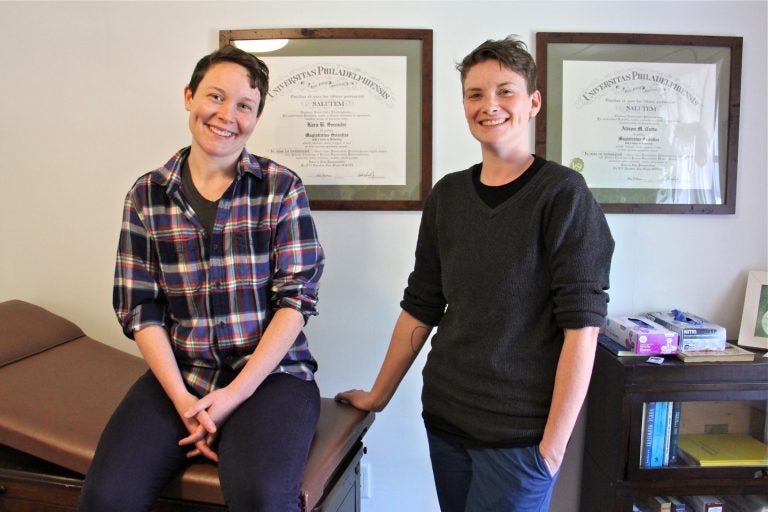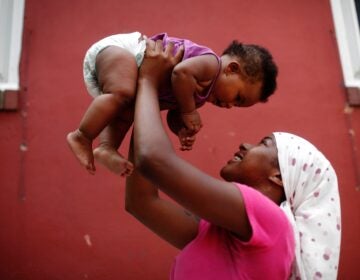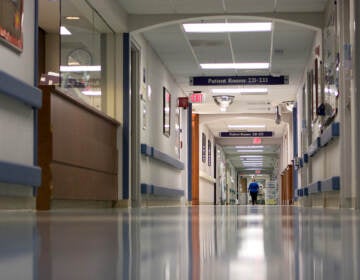Midwives hope Philly’s first free-standing birth center will make inclusive care more accessible
The Philadelphia Midwife Collective has launched a GoFundMe campaign to open a birth center they hope will make inclusive care more accessible.
Listen 1:33
Kara McQuillan (left) and Mac VanTilburg of the Philadelphia Midwife Collective are trying to open Philadelphia's first free-standing birth center in Germantown. (Emma Lee/WHYY)
At 23 weeks, Asia Brown described herself as a “crazy, frantic pregnant lady,” researching all of her options for the birth of her first child.
Brown, 23, an African-American woman who lives in Germantown, is passionate about holistic medicine. She didn’t want to be hooked up to any IVs during her labor and wanted to be as unencumbered as possible before her delivery.
There are no free-standing birth centers in Philadelphia — so Brown visited a birth center in Montgomery County, but was turned off by the fact that she wouldn’t meet the midwife until right before she would start giving birth.
She also considered homebirth — and after lots of searching, she found the Philadelphia Midwife Collective, which has an office down the block from her home.

Ultimately, Brown chose to deliver at home with the collective. In October, she had a baby girl. She said her birth was a positive experience because of the collective’s focus on inclusivity. She thinks her labor would have been different in a hospital setting.
“As a black woman, births are different for us than anybody else,” Brown said. “We are really treated unfairly by hospital staff and things of that nature.”
A 2017 ProPublica investigation found that women who delivered at hospitals that disproportionately serve black women were at a higher risk of health complications.
Black women die at four times the rate of white women due to pregnancy-related complications in the United States. In Philadelphia, 74% of recorded maternal deaths were in the African-American community, according to a report by the city’s public health office that examined deaths from 2010-2012.
For those skeptical of hospitals, the options can be slim.
Medicaid doesn’t cover out-of-hospital births unless they take place in an approved facility. And health insurance coverage for at-home births can vary widely between states and insurers.
Birth centers are seen by a growing number of mothers to be a favored alternative. But for many Philadelphia moms-to-be, convenience is lacking. The closest birth center to Germantown, for instance, is in Bryn Mawr, which means a 30-minute drive or over an hour on public transportation.
The Philadelphia Midwife Collective, though, wants to change that. Last month, on the International Day of the Midwife, leaders Kara McQuillan and Mac VanTilburg announced plans to open the city’s only free-standing birth center in Germantown by 2020.
The nonprofit launched a GoFundMe, which has so far raised over $12,000 of its $20,000 goal.
“Marginalized folks of all types are really struggling within the system and they’re asking for and needing out-of-hospital birth, and so we are really motivated to offer that to them in a way that is financially accessible and physically accessible,” VanTilburg said. “To be within city limits means you can get here with public transportation and that you’re not dragging your kids and family and taking off work to go into the suburbs.”
Brown believes the center is badly needed for Philadelphia’s African-American community.
“It’s important to have things in the ‘hood that they have everywhere else, to be very blunt about it,” Brown said. “We deserve and we need other things because we should be included as well — as black women, as black people.”
Why a birth center?
Birth centers are for low-risk pregnancies. Prenatal care begins in the office with midwives who value developing relationships with patients before labor. The rooms tend to have a more home-like atmosphere and holistic care is prioritized.
In their work as midwives, VanTilburg and McQuillan have heard stories from their clients about traumatizing experiences of racism or LGBTQ parents being mistreated by their medical providers.
With a focus on social justice, VanTilburg and McQuillan hope their planned birth center will give people access to a more welcoming childbirth experience.
“As queer-identified providers, we are particularly attached to making this space feel really open to anyone who wants to come access it,” VanTilburg said. “And so for us, that means facilitating all the ways to have your baby and not really bringing in our own ideas about what’s important to the table.”
The collective hosted its first focus group with Germantown residents about two months ago and plans to host more to gather community input.
McQuillan said, so far, the plan has been well received by the neighborhood.
“Most major cities have multiple birth centers within the city limits and Philadelphia is one of the only ones that has none,” McQuillan said. “So I think people want options, either because of personal experiences with midwifery care or just believing that there should be more options within Philadelphia.”
The collective plans to raise funds through December. They’ve also applied for grants to pay for expenses, such as rent and medical equipment.
VanTilburg said they hope the Germantown birth center is just the first of many in the city.
“Every neighborhood has a really different feel and the birth center should reflect that neighborhood and who it’s going to be serving,” VanTilburg said.
WHYY is your source for fact-based, in-depth journalism and information. As a nonprofit organization, we rely on financial support from readers like you. Please give today.





